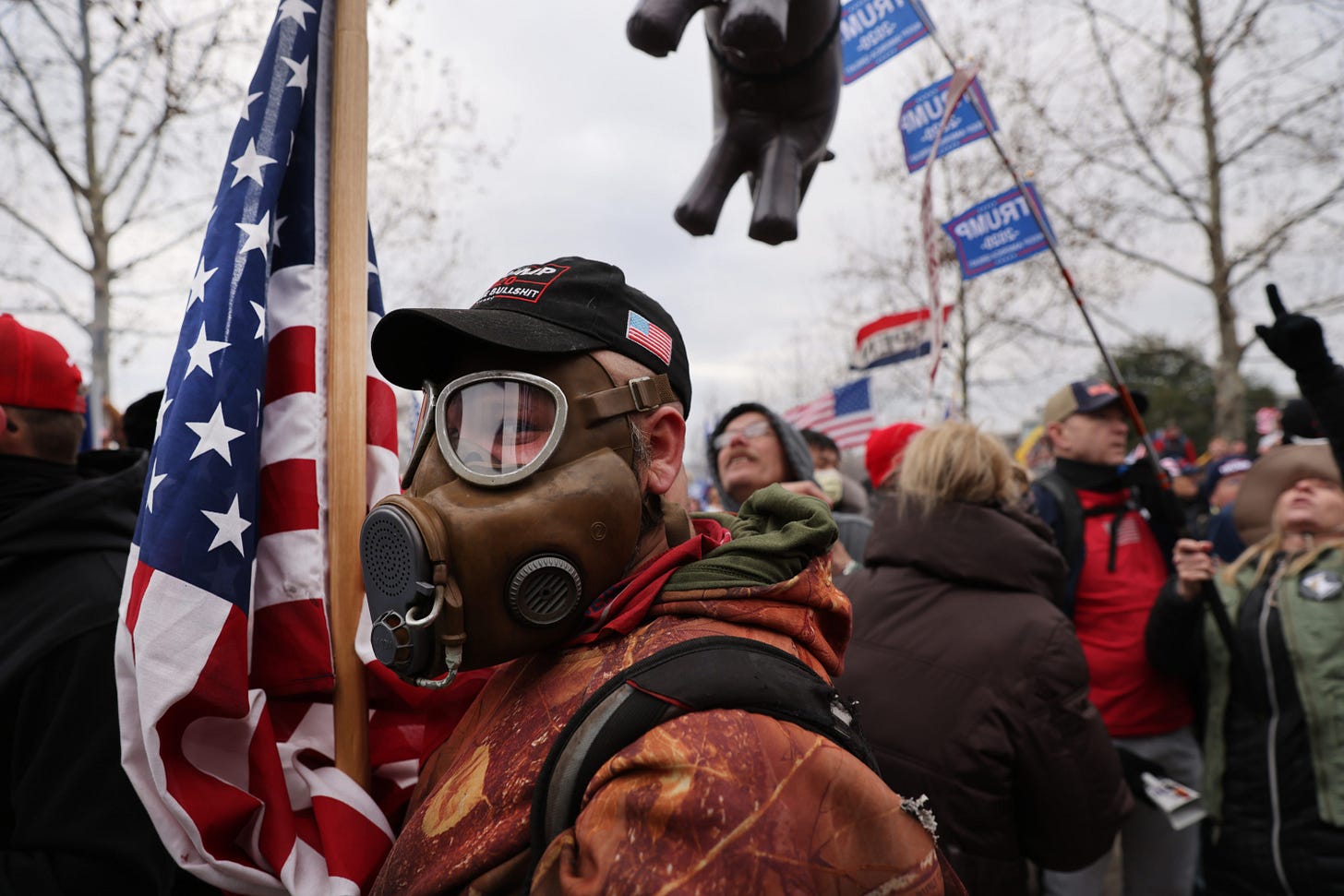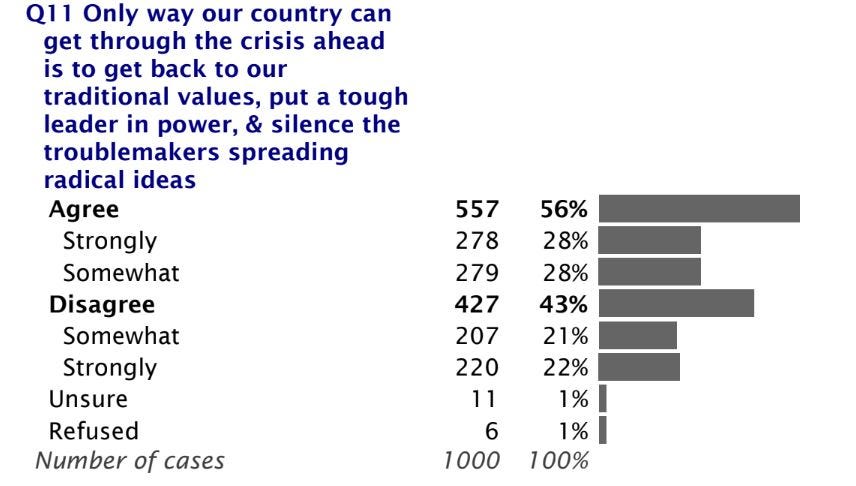New Poll: One Year After Jan. 6th, Disturbing Support for Authoritarianism
Survey suggests that millions of Americans would support an “armed revolt” to put Trump back in the White House.

A year after supporters of Donald Trump attacked the U.S. Capitol in an attempt to overturn his election defeat, a new survey has found that a small but significant portion of his devotees believes he should be reinstated by any means, including armed revolt.
More generally, the survey, which I sponsored, finds that, although Americans remain strong believers in liberty, there is a powerful undercurrent of potential support for authoritarianism.
The survey of 1,000 American voters was conducted online and by phone between Christmas and New Year’s by political scientist David B. Hill of Hill Research Consultants. Respondents were asked a battery of 21 agree-or-disagree questions—indicators of possible support for or opposition to authoritarianism. The results were then weighted to match national demographics. (The poll results and an explanation of the methodology can be found here.)
The responses showed solid majorities of support for liberty, democracy, and the rights of protesters.
However, nearly half the respondents (49 percent) agreed with the assertion that “Once our leaders give us the go-ahead, it will be the duty of every patriotic citizen to help stomp out the decay that is poisoning our country from within.”
More than half (56 percent) agreed with the sentiment that the “only way our country can get through the crisis ahead is to get back to our traditional values, put a tough leader in power, and silence the troublemakers spreading radical ideas.”

Half (50 percent) agreed that it is more important for a leader to “stir the deep passions of the common man than to offer intellectual advice about policies.”
And more than half (53 percent) agreed that the country will be great if we “honor the ways of our forefathers, do what the authorities tell us to do, and get rid of the rotten apples who are ruining everything.”
More troubling than those majority or near-majority responses, however, are some of the strong minority views unearthed in the survey. When presented with the claim that “We might have to make America a little less democratic in order to protect and preserve the most important American values, traditions and principles,” more than a third of the respondents agreed (34 percent, including 12 percent saying they “strongly” agree).
More than a fifth of the respondents (21 percent) consider democracy “so corrupted” that “we need new revolution to reestablish order.” And nearly as many (18 percent) say that the Constitution “gets in the way of things too much nowadays and should just be ignored when it interferes with taking action on some issues.”
Regarding the former president, a third of the respondents (33 percent) say they believe the 2020 election was “stolen” from him. Out of that third, a majority considers the participants in the Jan. 6th attack on the Capitol to be “patriots” rather than “insurrectionists.” A small minority of the Trump-supporting respondents (13 percent, or nearly 5 percent of the overall sample) believe the ex-president should “reinstated by all means possible, including armed revolt,” including a small number (just under 2 percent of the overall sample) who say they themselves would be willing even to “take up arms” to see Trump reinstated.
As a former university lecturer in Holocaust studies, I’ve watched America’s slide towards autocracy with a feeling of both alarm and familiarity. We’ve seen this movie before. We know how it ends.
Since the Jan. 6th insurrection one year ago today, various surveys have shown continuing support among Republicans for Donald Trump and his Big Lie about the 2020 election. Some of the surveys show support for violence to achieve political ends—such as this Washington Post/University of Maryland poll from mid-December showing that more than a third of respondents (34 percent) believe that violence against our government can sometimes be justified. Many other recent polls confirm this finding.
But how many Trump supporters would be willing to actually take up arms to reinstate him as president? I watched for this number, but all the polls I saw focused on attitudes, not actions. So I contacted David Hill and commissioned the new poll to measure just how autocratic we are today and expect/want to be in the future.
The results were even more alarming than I suspected. As noted above, in our survey nearly 2 percent of the respondents said they would be willing to take up arms to restore Trump to power. Admittedly, that figure is within the poll’s margin of error (3 percent). But assuming that it is accurate, that 2 percent, if extended to the entire nation, would translate to some 3 million people willing to take up arms in support of Trump. That’s a number that should get all of our attention.
Academics have drawn various historical parallels to today’s divided and contentious America. Some hark back to 1968—the assassinations, Viet Nam, the Chicago convention, the Moral Majority vs. the New Left. Others go back to the period leading up to the Civil War.
I believe the more accurate analogy is with Germany in the early ’30s. As dramatic as that might sound, consider some of the parallels between the events of the past five years in the United States and Weimar Germany’s slide into totalitarianism:
Attacks on truth: The Trump movement—from the prevaricating ex-president to his loyalists to their Republican legislative allies on down to the base—simply refuses to acknowledge the truth about the 2020 election, even when presented with clear-cut evidence. What American president other than Trump could get away with saying “What you’re seeing and what you’re reading is not what’s happening”? We’ve now reached the point where the only elections Republicans will accept are the ones they win.
Suppression: Like Trump, the Nazis never won a majority of the popular vote. But once installed in office, they moved quickly and decisively to solidify their power. After Trump’s attempt to overturn the 2020 election failed one year ago today, Republican-led state legislatures started passing legislation restricting access to voting. They have also sought to oust impartial election officials, seeking to put Trump allies in important posts responsible for the counting and certification of votes in upcoming elections.
Demonization: Every autocrat needs an enemy, someone to demonize and hold up to their audience as the source of their problems. For Hitler it was the Jews, even though they constituted less than 1 percent of Germany’s population. Trump’s parade of enemies is a long one, starting with Mexicans and Muslims, then continuing to include the press and the “Deep State”—and of course any Republicans who dare to dissent from Trumpism.
Intimidation: The Nazis perfected the art of terrorizing an entire country. In the United States, we have seen death threats against public officials and hostile rants against local school board members. And while the intimidation has largely been verbal to date, we’re just one murder of a school board member or local politician away from seeing the candidate pool go dry.
Education: The various right-wing objections to how American students are educated—most prominent nowadays in complaints about critical race theory—don’t reach Nazi levels of control but are troubling in their desire to repress facts, especially relating to race in America.
In my seminars on genocide and the Holocaust, I taught students that genocide is like cancer: You have to recognize it in its earliest forms and treat it aggressively. By the time you reach the point of concentration camps or gas chambers, it’s too late. While we are nowhere near that point, the trends are worrying.
Our liberal democracy is in danger. And unfortunately, no one—not the Biden administration, not Congress, not the Democratic party, not the majority of Americans—seems capable of taking the actions needed to protect it. An entire year has gone by since the attack of January 6th, allowing a penchant for totalitarianism to metastasize in a sizable segment of our population. We can’t let another year go by without acting to protect our democracy.

